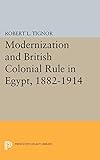Modernization and British Colonial Rule in Egypt, 1882-1914 / Robert L. Tignor.
Material type: TextSeries: Princeton Studies on the Near East ; 2000Publisher: Princeton, NJ : Princeton University Press, [2015]Copyright date: ©1966Description: 1 online resource (430 p.)Content type:
TextSeries: Princeton Studies on the Near East ; 2000Publisher: Princeton, NJ : Princeton University Press, [2015]Copyright date: ©1966Description: 1 online resource (430 p.)Content type: - 9780691623641
- 9781400876327
- 325.3420962 22
- DT107 .T5eb
- online - DeGruyter
- Issued also in print.
| Item type | Current library | Call number | URL | Status | Notes | Barcode | |
|---|---|---|---|---|---|---|---|
 eBook
eBook
|
Biblioteca "Angelicum" Pont. Univ. S.Tommaso d'Aquino Nuvola online | online - DeGruyter (Browse shelf(Opens below)) | Online access | Not for loan (Accesso limitato) | Accesso per gli utenti autorizzati / Access for authorized users | (dgr)9781400876327 |
Browsing Biblioteca "Angelicum" Pont. Univ. S.Tommaso d'Aquino shelves, Shelving location: Nuvola online Close shelf browser (Hides shelf browser)

|

|

|

|

|

|

|
||
| online - DeGruyter New Essays by De Quincey : His Contributions to the Edinburgh Saturday Post and the Edinburgh Evening Post / | online - DeGruyter Ghana's Foreign Policy, 1957-1966 : Diplomacy Ideology, and the New State / | online - DeGruyter The Poems of Sir George Etherege / | online - DeGruyter Modernization and British Colonial Rule in Egypt, 1882-1914 / | online - DeGruyter The Theory of Price Uncertainty, Production, and Profit / | online - DeGruyter Desegregation : Resistance and Readiness / | online - DeGruyter Military Attache / |
Frontmatter -- Preface -- Contents -- I. The British Occupation of Egypt -- II. Egypt in 1882 -- III. The Search for a Policy, 1882-1888 -- IV. First Administrative Reforms, 1888-1892: Agriculture and Law -- V. Political Crises, 1892-1894 -- VI. Administrative Progress, 1895-1907: The Bureaucracy -- VII. Administrative Progress, 1895-1907: Agriculture and Irrigation -- VIII. The Nationalists and Lord Cromer, 1895-1907 -- IX. Gorst and Kitchener: New Policies -- X. Administrative Change: Education and Public Health -- XI. British Administration and Other Agents of Modernization -- XII. Egypt in 1914 -- XIII. Some Conclusions on British Rule in Egypt -- Selected Bibliography -- Index
restricted access online access with authorization star
http://purl.org/coar/access_right/c_16ec
In occupied Egypt, British governmental programs were closely related to England's needs as an imperial power since Egypt was occupied because of its strategic position along the route to India. British presence there, however, inevitably led to modernization during the 32 years of British rule. During the first period the British were preoccupied with the prospect of imminent withdrawal. The second period emphasized programs for such reforms as hydraulic and agricultural modernization, wider education, and urban development. The final period covered the emergence of Egyptian nationalism, whose goals proved incompatible with British rule of Egypt in spite of efforts to deal with nationalism by repression or conciliation.Originally published in 1966.The Princeton Legacy Library uses the latest print-on-demand technology to again make available previously out-of-print books from the distinguished backlist of Princeton University Press. These editions preserve the original texts of these important books while presenting them in durable paperback and hardcover editions. The goal of the Princeton Legacy Library is to vastly increase access to the rich scholarly heritage found in the thousands of books published by Princeton University Press since its founding in 1905.
Issued also in print.
Mode of access: Internet via World Wide Web.
In English.
Description based on online resource; title from PDF title page (publisher's Web site, viewed 30. Aug 2021)


